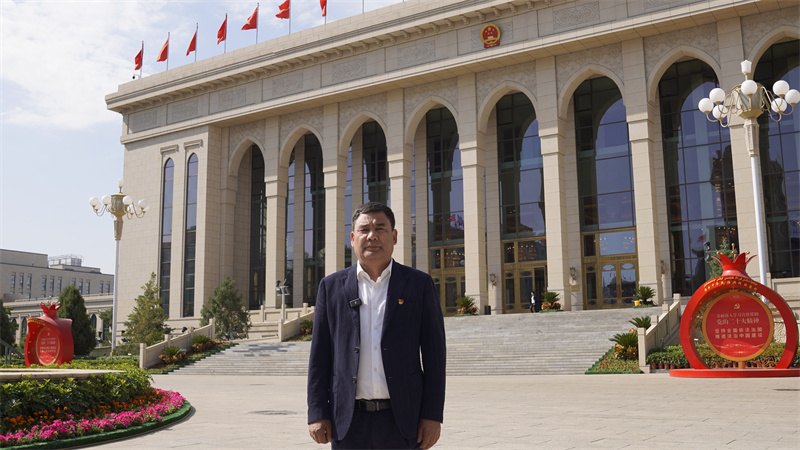Deputy from Xinjiang school fosters students' confidence in Chinese culture

Photo shows Kurban Niyaz, the principal of the first private Mandarin elementary school in Northwest China's Xinjiang Uygur autonomous region. [Photo/Na Yi]
After graduating from Xinjiang University with a degree in Chinese language and literature in 1986, Kurban became a teacher at Aksu Vocational and Technical College in Aksu prefecture of Xinjiang.
He later ventured into business and traveled across China, believing that without language barriers, one can go further.
Despite his success in the outside world, Kurban chose to return to his hometown in Yimamu town, Wushi county, Aksu prefecture.
In May 2003, Kurban invested all his savings of 600,000 yuan ($82,000) to establish a Mandarin elementary school, providing a bridge to modern civilization for the local children.
At first, his approach was not universally understood by the villagers, resulting in an initial enrollment of only more than 80 students.
"We must have a correct understanding of the relationship between China's excellent traditional culture and local ethnic culture. Chinese culture is the mainstream culture, and ethnic minority cultures are part of Chinese culture; they cannot be separated," Kurban said.
He strongly believed in the power of language to forge connections between people's hearts. His conviction was that by providing children with the opportunity to learn and embrace the rich traditions of Chinese culture, they would be able to achieve greater heights and go further in life.
With his unwavering belief, the school gradually gained recognition. In 2016, Musa Turhun, one of the school's first graduates, made history as the first Tsinghua University student from Wushi county. Today, the school receives 3,000 to 4,000 student applications annually, as parents aspire to enroll their children in this school.
Over the past two decades, the school has remained steadfast in using Mandarin as the medium of instruction and fostering students with the profound traditions of Chinese culture, instilling in them a deep sense of confidence in Chinese culture.
Today, activities like singing Peking Opera, playing the guzheng and erhu, and practicing traditional Chinese painting have gained popularity at the school. Students from diverse ethnic backgrounds are embracing the richness of traditional Chinese culture.
As a re-elected deputy to the NPC, Kurban has put forward many suggestions for promoting the education of the national common language and China's traditional culture in schools, some of which have been adopted and implemented. He will continue to fulfill his duties in this field.
- Top legislature schedules standing committee session for late February
- China's top legislator meets with Uruguayan president
- Senior legislator surveys Anhui on formulating outline of provincial 15th Five-Year Plan
- China's top legislator meets with British PM
- NPC deputies see more engagement with top court



